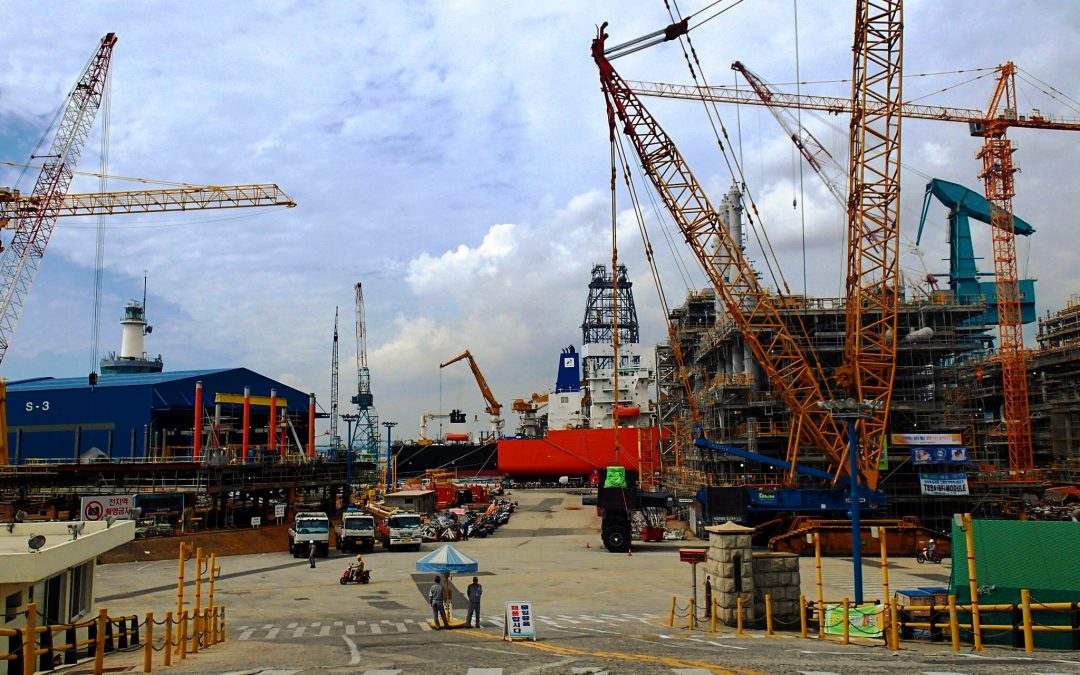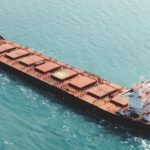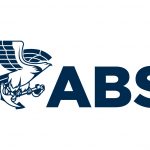The planned initial public offering (IPO) of Hyundai Heavy Industries (HHI) next month appears to face obstacles, with deadly industrial accidents and strikes affecting the operation of the country’s largest shipbuilder.
On the bright side, HHI already surpassed its yearly goal of ship orders worth 8.5 trillion won ($72 billion) by winning the orders worth 15.4 trillion won in the first half alone.
The company, however, was behind its rivals ― Daewoo Shipbuilding & Marine Engineering (DSME) and Samsung Heavy Industries ― in the first half in terms of production capacity.
According to banking industry sources, production capacity is part of the eligibility criteria for an IPO.
HHI reached a production capacity of 61.9 percent for its shipbuilding operation and 17.9 percent for offshore platforms.
On the other hand, each Daewoo and Samsung utilized 98.2 percent and 91 percent of their production capacities for the two aforementioned businesses combined.
HHI’s is also behind in overall achievement compared to its two sister companies ― Hyundai Samho Heavy Industries and Hyundai Mipo Dockyard ― that altogether operate under the wing of their sub-holding company, Korea Shipbuilding & Offshore Engineering (KSOI).
Hyundai Samho was at 89.5 percent production capacity and Hyundai Mipo reached 81.6 percent.
The industry sources partly attributed HHI’s underperformance to deadly workplace accidents that prompted temporary suspension of operations at affected sites for investigation by the labor authorities.
The company has had about 20 cases of serious workplace disasters in the past five years. The cases include three deaths this year, one each in February, May and July, with lack of precaution cited as a reason for the industrial accidents. One worker was hit by a 2.5 ton iron plate and another fell off a rooftop while performing maintenance work.
In a worst-case scenario, failure to observe industrial safety is expected to result in a management vacuum considering the law on criminal punishment of responsible business owners or CEOs will take effect in January next year.
The strikes in protest of a union-management gap over wage talks are seen as another risk to HHI’s plan to go public.
The two sides managed to reach an agreement over next year’s minimum wage in July, only after the union began a partial strike ― four hours per day during the five working days in the first half ― until their demands were met.
Some 57.5 percent of HHI’s regular workers are union members.
They complained of falling real income in a prolonged pandemic marked by growing income inequality and rising prices.
“This opens up chances for a series of strikes next year and years after as long as the union is not satisfied with management in wage talks,” a sources said.
The planned initial public offering (IPO) of Hyundai Heavy Industries (HHI) next month appears to face obstacles, with deadly industrial accidents and strikes affecting the operation of the country’s largest shipbuilder.
On the bright side, HHI already surpassed its yearly goal of ship orders worth 8.5 trillion won ($72 billion) by winning the orders worth 15.4 trillion won in the first half alone.
The company, however, was behind its rivals ― Daewoo Shipbuilding & Marine Engineering (DSME) and Samsung Heavy Industries ― in the first half in terms of production capacity.
According to banking industry sources, production capacity is part of the eligibility criteria for an IPO.
HHI reached a production capacity of 61.9 percent for its shipbuilding operation and 17.9 percent for offshore platforms.
On the other hand, each Daewoo and Samsung utilized 98.2 percent and 91 percent of their production capacities for the two aforementioned businesses combined.
HHI’s is also behind in overall achievement compared to its two sister companies ― Hyundai Samho Heavy Industries and Hyundai Mipo Dockyard ― that altogether operate under the wing of their sub-holding company, Korea Shipbuilding & Offshore Engineering (KSOI).
Hyundai Samho was at 89.5 percent production capacity and Hyundai Mipo reached 81.6 percent.
The industry sources partly attributed HHI’s underperformance to deadly workplace accidents that prompted temporary suspension of operations at affected sites for investigation by the labor authorities.
The company has had about 20 cases of serious workplace disasters in the past five years. The cases include three deaths this year, one each in February, May and July, with lack of precaution cited as a reason for the industrial accidents. One worker was hit by a 2.5 ton iron plate and another fell off a rooftop while performing maintenance work.
In a worst-case scenario, failure to observe industrial safety is expected to result in a management vacuum considering the law on criminal punishment of responsible business owners or CEOs will take effect in January next year.
The strikes in protest of a union-management gap over wage talks are seen as another risk to HHI’s plan to go public.
The two sides managed to reach an agreement over next year’s minimum wage in July, only after the union began a partial strike ― four hours per day during the five working days in the first half ― until their demands were met.
Some 57.5 percent of HHI’s regular workers are union members.
They complained of falling real income in a prolonged pandemic marked by growing income inequality and rising prices.
“This opens up chances for a series of strikes next year and years after as long as the union is not satisfied with management in wage talks,” sources said.
Source: Hellenic Shipping News






